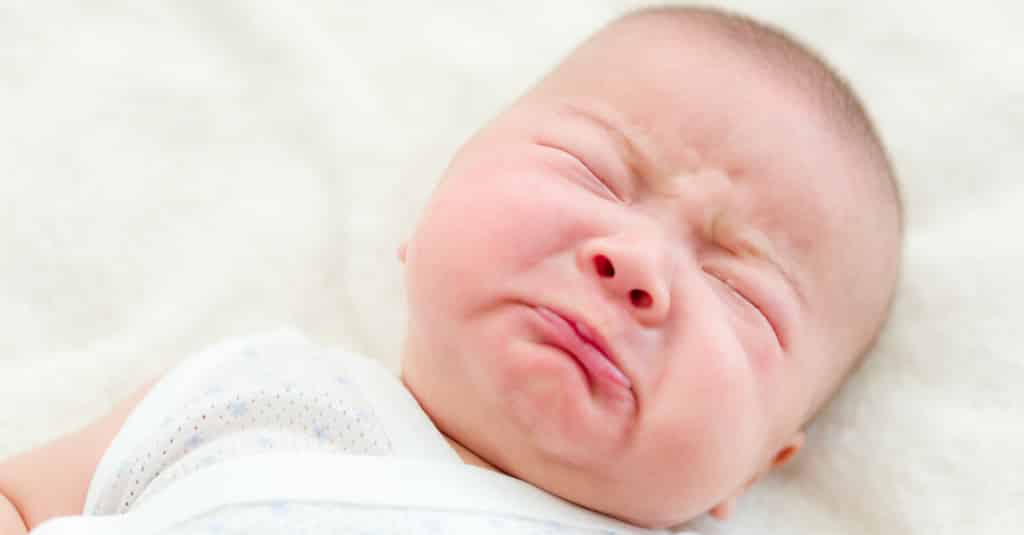How To Tell If Your Child Is Constipated
Constipation refers to the compactness of the stools and the difficulty passing them, not the frequency of bowel movements. The consistency and number of stools vary according to age and from baby to baby. Newborns have several stools a day that are soft and the consistency of seedy mustard, especially if breastfed. Formula-fed infants usually have fewer, firmer, and darker stools. Once solid food enters the diet, the stools become more formed and less frequent, and some babies may have a bowel movement without difficulty only once every three days, but daily is preferable.
Constipation In Newborns: Know The Causes And Treatments
If there is anything worse than having constipation, its watching your newborn deal with it. Newborn constipation often happens when a child transitions from one food to another, such as going from breast milk to formula, or from formula to solid foods. The absence of daily bowel movements doesnt necessarily indicate constipation what you should look for is the passage of dry, very hard bowel movements. After knowing the cause of constipation in your baby, proper measures should be taken to get rid of this discomfort.
Treating Constipation In Babies
- If your baby is bottle-fed, check the formula tin to make sure the formula is being made correctly. Always measure the water first and then add formula powder.
- Offer extra drinks of water.
- Gentle tummy massage can help.
- A warm bath may help the babys muscles to relax .
- Give only medication prescribed by your doctor.
Don’t Miss: How To Get Newborn To Sleep Alone At Night
Stools: How Often Is Normal
- Normal Range: 3 per day to 1 every 2 days. Once children are on normal table foods, their stool pattern is like adults.
- Kids who go every 4 or 5 days almost always have pain with passage. They also have a lot of straining.
- Kids who go every 3 days often drift into longer times. Then, they also develop symptoms.
- Passing a stool should be free of pain.
- Any child with pain during stool passage or lots of straining needs treatment. At the very least, the child should be treated with changes in diet.
When To Seek Help

Very rarely, constipation can be a sign of an underlying health problem. If a baby under 6 weeks is constipated, you will need an assessment by a doctor to exclude an underlying condition.
Take your baby to a doctor, or seek help from a midwife or child health nurse if:
- your babys poo is dry and crumbly or like pellets, or they seem to have pain and discomfort when doing a poo
- your baby is constipated and they are gaining weight slowly
- they have blood in their poo
You can also read more about constipation in children.
Also Check: Should I Buy Newborn Clothes
What Can You Give Your Baby For Constipation
If changes in your babyâs diet havenât given him relief from constipation, your babyâs healthcare provider might recommend an infant glycerin suppository, which is placed in your babyâs rectum. These types of suppositories are meant to be used only occasionally, and shouldnât be overused. Do not use mineral oil, enemas, constipation medicine, or any stimulating laxatives to treat your babyâs constipation. Always follow your healthcare providerâs advice.
Add More Fiber Foods To Childs Diet
Fiber softens the stools by drawing water into them, making them bulkier and easier to pass. Fiber foods for older babies are bran cereals, graham crackers, whole-grain bread and crackers, and high-fiber vegetables such as peas, broccoli, and beans. Supplementing is a good way to increase your childs fiber intake without causing additional gas or bloating. We recommend Sunfiber or Regular Girl, which blends invisibly into your childs favorite foods including cereals, yogurt, juice, and pancakes without changing the texture, taste, or aroma. Your child wont even have to know its in there!
Also Check: What To Do For Gassy Newborn Baby
What Is Constipation In Babies
To understand baby constipation, itâs important to know what stools are like for infants. Although every baby is different, and thereâs a broad range of whatâs considered normal when it comes to pooping, many babies will poop after each feeding in the first weeks of life. Then, after about 3 to 6 weeks of age, some breastfed babies will poop less often, even as little as once a week. That’s because breast milk creates almost no solid waste that has to be eliminated from the digestive system. Formula-fed babies tend to poop once a day or once every other day.
In terms of consistency, your babyâs stools should be soft, like peanut butter, when everything is normal and regular. Your baby may be constipated if she experiences hard, dry bowel movements, which can be difficult or even painful to pass. And, if your babyâs constipated, her bowel movements may be more infrequent than whatâs typical or normal for your baby.
Q When Is It Normal For Breastfed Babies To Stop Pooing As Often
Any age from about three weeks and over, but more commonly from six weeks, breastfed babies may start to space out their poos even as much as a week or more apart. This can seem alarming, but in a healthy baby, its usually nothing to worry about and doesn’t usually suggest that your infant is constipated.
The poo, when it comes, will be soft and easy to pass because of the way the gastro-colic reflex has changed. This is the reflex that is stimulated by food going into the top of the digestive tract causing a reflex action at the other end and its very sensitive in a newborn. So its quite normal for a new baby to poo virtually every time he feeds.
As your baby gets a bit older, that reflex is nothing like as sensitive, and they can hang on to their poo, storing it in the lower bowel for some time. This is why you sometimes get a very large amount of poo when your baby does finally go!
Also Check: How To Treat Colic In A Newborn
How Can I Help My Constipated Baby
Thankfully, there are a number of things you can do to help relieve your babys constipation. Here are a few tips to help your little one feel better:
- Give your baby some cooled, previously boiled water. If your baby is formula-fed, do not add additional water to their formula instead, give them extra water in between feeds.
- Check the formula. If your baby is formula-fed, make sure you are using the right amount of powder when mixing their formula. Too much can cause your baby to become constipated.
- Talk to your doctor or local pharmacist. If your baby is constipated, it is worth asking them about specialist formulas that can help with this.
- Give your baby a little tummy rub. It may sound strange, but rubbing your babys stomach in a clockwise circular motion can really help their digestion.
- Do the baby bicycle. With your baby lying on their back, gently move their legs in a cycling motion. This can help relieve any trapped wind and kickstart their little digestive system. Many babies tend to find this very relaxing, too.
- Give them some fruit. At around six months, if you have already started weaning your baby, then try feeding them fruit. The natural fibre in fruit can help get things moving again.
- Give them a warm bath. This can help your baby relax and the warmth can soothe their aching tummy.
Older Child Constipation Signs:
Teach your kids to look in the toilet bowl. Use this handy poop chart to start the dialogue so that your children know how to talk with you about their poop shape.
- 1: Jelly beans or rabbit droppings
- 2: A nut bar or a bunch of grapes
- 3: A corncob or chocolate-coated, nut-filled candy bar
- 4: A snake or sausage . This is considered normal. Its okay if it has a few cracks on the surface or if its a bit softer.
- 5: Marshmallows or chicken nuggets
- 6: Oatmeal, frosting, or peanut butter
- 7: Milkshake or gravy
Read Also: Can I Use Water Wipes On Newborn Face
Treating Your Baby’s Constipation
Give your baby a warm bath to relax their bowel.
Gently massage your babys tummy in a clockwise direction. Make firm but gentle circular motions from the belly button outwards.
Lie your baby on their back and gently move their legs backwards and forwards in a ‘bicycle’ motion.
Never give your baby laxatives unless a doctor or public health nurse advises you to.
Make sure your baby is getting their daily fluid needs. Babies from 0 to 6 months should take in 700 ml of fluids per day, from breast milk or formula milk.
Causes Of Constipation In Children

Constipation happens for several reasons.
It can happen when children hold poos in. They might hold poo in because they:
- are too busy playing
- have pain when they do a poo and theyre afraid to go to the toilet
- dont want to use the toilets at preschool or school.
Constipation might also happen because children:
- arent eating enough fibre
- have been sick and have been eating and drinking less.
These situations can all lead to a build-up of poo in the bowel. When this happens, the poo gets too big or hard to push out easily.
There are some underlying medical conditions that might cause constipation in children, but these arent common.
Read Also: How Do I Get A Pediatrician For My Newborn
Does Gripe Water Help With Constipation
The study also found that mothers and caregivers reported more vomiting and constipation in the infants who received the gripe water. 1 Although that study doesnt necessarily prove that gripe water causes more vomiting and constipation it is an indication that gripe water doesnt seem to help those babies either.
What Makes My Newborn Constipated
As you start introducing solid foods to your baby and cows milk , your baby may poop more frequently. Thats because your babys digestive system is still immature and has to figure out how to digest all these new foods. On the flip side, your baby may now become constipated.
Don’t Miss: Why Do Newborns Get Fussy At Night
How To Treat Newborn Constipation
Fortunately, there are many ways to help relieve the discomfort and get things moving again. Here are a few home remedies that are proven to help:
Sometimes a baby might have severe constipation that doesnt clear up with any home remedies in that case, the doctor might need to intervene to help your child pass stools. This might include medications or other remedies that you cant try at home.
The following video has even more information on how to treat newborn constipation:
Categories
How Do You Make A Turtle Poop
There are a couple of ways to make your turtle poop:
1) By giving them a warm bath.
2) Make sure that their habitat has enough room, and is not cluttered.
3) Change their diet by adding more insects or meat into it.
4) Gently massage the area around their vent.
5) If your turtle is being stubborn, you can try feeding them some cactus juice, coconut water, or papaya.
6) Also, make sure that the temperature is correct in their habitat.
Recommended Reading: When Do You Wash A Newborn
Can Turtles Eat Lettuce And Become Constipated
Leafy vegetables are good for your turtle to eat every day, but lettuce is not.
Lettuce has very little nutritional value so it should only be given as a treat once in a while.
It also contains lactucarium which is known to cause depression when ingested by reptiles.
Lettuce is not good for your turtle, so it should only be given as a small treat every now and then.
What Are Some Home Remedies For Baby Constipation
If your baby becomes constipated once heâs started on solid foods, check in with your healthcare provider, who may recommend any of the following changes or additions to his diet to help relieve constipation:
-
Water. If your baby is over 6 months old , offer him a little water in a sippy cup with his meals. This shouldnât replace breast milk or formula, however.
-
Fruit juice. A few ounces of 100 percent fruit juice such as apple, pear, or prune juice can also help your baby. These juices contain sorbitol, which works like a natural laxative.
-
Certain fruits and vegetables. Once your baby is eating solid foods, give him pureed foods such as prunes, pears, peaches, and peas. These can help with constipation since they contain more fiber than other fruits and vegetables.
-
Infant cereals. Try feeding him whole-wheat, barley, or multigrain infant cereal once he is eating solid foods. These three types contain more fiber than rice cereal and may help get things moving.
If the above dietary changes havenât given your baby relief, contact his healthcare provider again for guidance.
Also Check: How Often Do You Bathe A Newborn
How To Tell If Your Baby Is Constipated
Newborn bowel movements vary from one baby to another depending upon their milk intake and body. Some babies pass stool many times a day while some can hold the stuff in for as long as 3 days. If you are breastfeeding, you may notice a frequent newborn bowel movement as compared to that of a fully formula-fed baby.
Your newborn is constipated if…
- He hasn’t had a bowel movement for 3 days or more.
- Even if he has passed stool, the stool is dry and harder than normal and the baby finds it difficult to pass it. You may find your baby making disgruntled faces while passing stool.
- Sometimes after days of “dry spell”, you notice a watery stool and may confuse it with diarrhea. It is actually one of the symptoms of constipation in newborns, i.e., liquid stool seeps out of the blockage in the small intestines and end up in the diaper.
Seattle Children’s Urgent Care Locations

If your childâs illness or injury is life-threatening, call 911.
You May Like: How To Help Your Newborn Pass Gas
